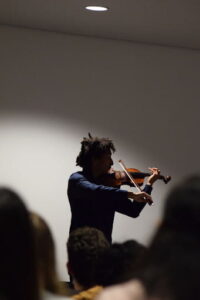by awakelin on January 10, 2022
Campus

On Nov. 13, Student Congress’ Awareness, Education, and Collaboration (AEC) Committee held Amplifying Voices, a performance in the Center at Moore Hall’s Bouligny Lounge. The open-mic styled event gave the opportunity for student groups to present or perform various forms of art. These included dance, poetry, and monologues on topics ranging from identity, culture, representation, and awareness.
The event began with an opening speech by the chair of the AEC Committee, Catalina Betancur-Velez ’23, on the importance of the performances in the greater representation of different diverse groups on-campus.
The AEC was formed as a response to campus-wide concerns regarding equity and diversity at Providence College. The committee has researched the history of student demands and the long-term history of the struggle for diversity on campus. They have presented in front of various College administrators, the Board of Trustees, and Father Kenneth Sicard, O.P., in efforts to cultivate a more equitable campus.
PC has long struggled to provide more inclusive spaces for those students, faculty, and staff who comprise a community of underrepresented groups on campus. These include BIPOC, the LGBTQ+ community, and other historically marginalized groups who continuously feel the alienation of PC’s homogenous student population. Events like Amplifying Voices create the safe spaces necessary to encourage and to promote dialogue on issues faced by those most marginalized on campus.
Mariela Flores ’23, who performed “Creep” by Radiohead, was one of the many student performers featured during the event. Flores describes, “This event meant a lot to me. As a BIPOC on campus, I personally know the talents that exist among us as well as the kind of stories that each of us carries. But, it was so beautiful to see BIPOC get the stage and make it their own. I teared up many times seeing these talents being showcased in a space that felt safe and felt filled with so much love and support.”
Art, regardless of the capacities of creative expression, presents intrinsic emotional, moral, and cultural values beyond the aesthetic value of solely performing creative pieces. These student performances reflected on the complex expressions of visibility and awareness of the multifacetedness of each performer’s own identity, especially of the tribulations toward achieving just representation within educational institutions like PC.
The student performers included Jezel Tracey ’24, Hashim Hassan ’23, Orlando Ramos ’25, Grace Higgins ’22, Diego Avila ’22, Alexandra Guzman ’22, Santiago Najarro-Cano ’24, Sorieba Fofanah ’22, along with members of PC’s Footprints Gospel Choir.
Betancur-Velez describes the importance of holding events like Amplifying Voices, as they cultivate the necessary dialogue surrounding inclusion and equity, particularly among the student population. She said, “I want to thank all of the performers and the attendees, but especially the performers, as they were the essence of the event. To be so courageous and to put their talent and their voices out there is really special, and is a step in the right direction in terms of diversity and equity that we need to come together in celebration [of] and appreciation for everyone.”
Flores explained, “I think it is so important that PC continues to hold this kind of event because it makes its marginalized students feel heard. The fact [that] the event was organized by Congress felt validating as if the school is acknowledging that these are students that do deserve a space to showcase their talents and expression and that there is value to this.”
Tracey, another student performer, added that, “if PC continues to hold events like these, I believe that many students of color will be given the opportunity to contribute their gifts to PC’s community. But, also, I feel that all parties of PC’s community will be given an opportunity to experience, appreciate, and support such talents within PC’s community of POC.”
Events like Amplifying Voices create the artistic spaces necessary for students and faculty to perform their own pieces through creative means: most notably poetry, music, and dance. Further, the event presented the opportunity for the performers to express themselves through truly authentic means, in celebration of diversity and awareness, that are imperative to achieve inclusive and equitable treatment at PC.
In detailing the future of attaining just representation and equity among different groups on PC’s campus, Betancur-Velez concludes: “I’m hopeful for the future. It’s a battle against the current. There is a lot to be done, but I think these are issues that can be solved not only gradually, but also tangibly.”
This event extended beyond just sharing student performances as it also aided in constructing the political, cultural, and social narratives necessary to bolster change on campus. Through compounding the means of creative expression with the various intersecting forces of identity and awareness, Amplifying Voices actively sought to recognize the foundational importance of diversity and visibility of the most underrepresented on campus and will continue to do so for many years to come.